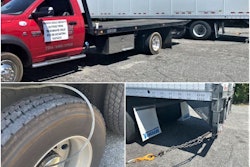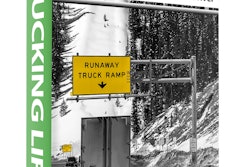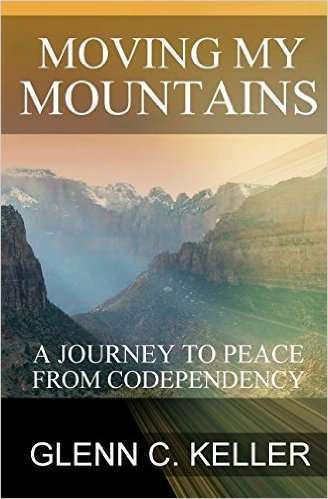
Keller, who in addition to trucking also runs a prayer line via his Making a Difference Ministries, has known most of his adult life that he suffers from codependency tendencies, as the subtitle of his new book makes clear: Moving My Mountains: A Journey to Peace From Codependency. The personality condition is one common to adults whose childhoods were marked by adversity of a variety of kinds, and it manifests in one-sided relationships of a variety of kinds in which sufferers often give until they can’t give anymore.
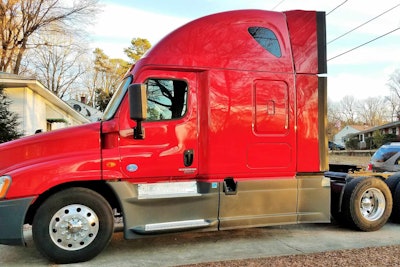 Glenn Keller hauls in this 2014 Freightliner Cascadia, powered by Detroit DD15, purchased last year.
Glenn Keller hauls in this 2014 Freightliner Cascadia, powered by Detroit DD15, purchased last year.Keller’s known his own such tendencies since he worked for a New Orleans investment firm as a wire operator — he was a young man in the early 80s, street-preaching on lunch breaks and other off-time and also volunteer with prayer for those admitted to Charity Hospital there. “I was spreading myself way too thin,” he says. At once, it was hard to “see there was something wrong trying to do all of that. I was doing good things.”

He was also serving once a week as host of local gospel radio show, and it was on one particular day, on his way to the station, that he turned his car around to go home. As he tells the story in the book, he’d hit a point where he just couldn’t continue on, and a depressed state fell over him.
“There were no more hospital visits,” he writes, “nor was there any more street preaching … I didn’t feel like praying. Was it possible that I had gotten so burnt out that I didn’t even feel like praying?”
He called the investment firm’s Employee Assistance Program hotline at a loss for anything else to do and talked it all out with the voice on the other line. Thus eventuated his first tour through a Codependency Anonymous group.
“When I really looked at everything I’d done in my life,” he says, taking his own memory tour through often one-sided relationships and a childhood marked by few outward expressions of emotion, of affection, “I actually sat there in that group and just cried. I can’t tell you what it was like to hear person after person get up and tell my story.”
Over the next decades, spending much of his time on the road as an owner-operator while continuing on in a life of faith and ministry, “people have told me all along, ‘you must really love that truck’,” he says, given the amount of time he spent within the cab’s confines, alone. When his mother had a stroke, “I was leased to Schneider. They offered to repower my load with another truck, and I said, ‘I’m sorry, but I need to take this ride.'” For him, the truck was a “security blanket,” to a degree, “a safe space” where he shielded himself from having to confront his particular demons.
But his mother’s eventual passing — two days after she was buried, he was back in the truck, on the road — at once spurred him on to finally put it all to rest by coming clean about everything he’d dealt with through the years via his codependent tendencies. The book presents to those who know Keller, he says, something of a different person — someone who has long struggled to overcome self-sabotaging tendencies, low self-worth, going overboard in relationships and more. He’d long feared revealing any of it.
But writing during the first half of last year with the intention of having Moving My Mountains released on his deceased mother’s birthday, August 13, Keller says “it was cathartic, getting all of that out of me.” It’d been a burden walking around with it all those years, advising those he interacted with in his ministry to take a particular course of action, but not doing the same himself a lot of the time.
“The story I told in the book was not how people saw me,” he says. “I had to tell everybody who thought they knew me one way” that there was another Glenn Keller who’d been nearby all that time. Growing up, “I didn’t have an affectionate home. One man said, ‘As soon as I finished the book I called my daughter to tell her how much I loved her.'”
The release of the “burden of walking around with it all,” Keller says, has been the biggest upshot for him personally “now that it’s out there. You don’t walk around with the fear anymore of, ‘what if everybody knew this about me?'”
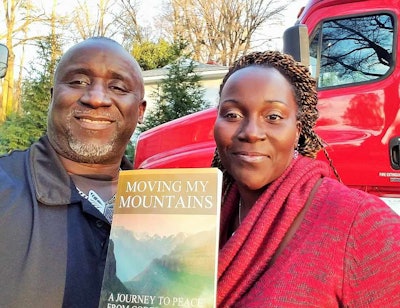 Glenn Keller, significant other Faye Smith and Keller’s “Moving My Mountains” book. The book is available in print via this link to BN.com and this to Amazon, among other retailers.
Glenn Keller, significant other Faye Smith and Keller’s “Moving My Mountains” book. The book is available in print via this link to BN.com and this to Amazon, among other retailers.Interspersed between chapters in which Keller tells his story are poems written to his mother after her passing. Most of them were written and posted to Keller’s Facebook profile over time when he feels his mother’s presence and the need to commune with her spirit. “That’s my way of communicating with her and letting everybody listen.”
There’s a happy ending to Keller’s story, in the end, but you’ll have to read the book to get there — we’ll say that ending has spurred him on to take his message of self-help through faith on to others, in an even bigger way.
Readers looking for a little uplift will no doubt find it here.

